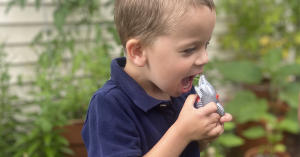What to Do if Your Picky Eater Is Bullied

Parents want children to socialize with their peers during play dates, after school activities, and sporting events. However, if your child is a picky eater, these events can be a breeding ground for bullying. If your child is experiencing bullying due to their picky eating, here are some tips to help.
Prevention
If your child consumes less than 20 foods or will only eat the same foods for certain meals, then your family could benefit from feeding therapy. Feeding therapy can help your kiddo expand their diet, learn sensory and motor techniques to help them eat certain textures, and decrease their anxiety about food. Sometimes, it only takes 1-2 sessions to get your kiddo feeling more confident about eating something new!
- Feeding Therapy: To start feeding therapy, look for a certified Speech-Language Pathologist or Occupational Therapist (that specializes in feeding) to help prevent bullying before it happens.
- Parent Coaching: Often, parents just need a few practical tips to help them focus on what they can do to help their child. I provide online coaching to give parents a step-by-step approach to helping their children without leaving their homes.
- Sensory Food Play: I encourage parents to allow their child to participate in a sensory food play activity each week. It is not a waste of food if your child learns how to tolerate the texture and eventually eat it.
Evasion
Educational experts specializing in bullying tell their students to stay away from places where bullying occurs. However, with our picky eaters, bullying frequently occurs in the cafeteria, which is not easily avoided. I’ve had clients act sick so that they can eat in the nurse’s office to avoid their bullies. Others refuse to eat anything at school and wait until they get home to consume their favorite foods. Nearly all of the picky eaters I work with have intentionally got in trouble (not true behavioral issues) in hopes of getting “punished” by having to eat in the principal’s office, their classroom, or detention room, to eat in peace.
- Social Circle: Make sure to educate your child’s coaches, tutors, teachers, and extended family about your child’s picky eating habits (and bullying experiences if you feel comfortable). Encourage them to help keep an eye out for your child, so they feel safe. Talk to your child about choosing an adult they trust at each event (school, soccer, etc.) to intervene on their behalf if they need help with a bullying situation.
Communication
We need to arm children who struggle to eat various foods to communicate with their peers, teachers, and well-meaning adults. Below are real comments bullies have said to my clients and their brave responses. Note – having candid discussions with your child about bullying and practicing how to verbally (not physically) respond is vital!
- Talking to an adult:
- Baseball Coach: “Johnny, you know if you ate something other than baby food, you would be a better player.”
- Child: “I have trouble swallowing, so I eat purees to keep me safe and off of a feeding tube.”
- Talking to a peer:
- Peer: “Surprise… Sally is eating chicken nuggets again!”
- Child: (Making direct eye contact with the bully) “You are bullying me. Please stop, or I will have to tell our teacher.”
I’ve shared a few ideas here, but how do you prevent and talk to your kids about bullying? Share your best tips in the comments and check out some of my other picky eating activities and tips on my Pinterest Page. #MsDawnSLP
Happy Feeding,
xo Ms. Dawn
P.S Want easy kid-approved recipes and picky eating tips? Check out the book I co-authored called: Making Mealtime ezpz.





